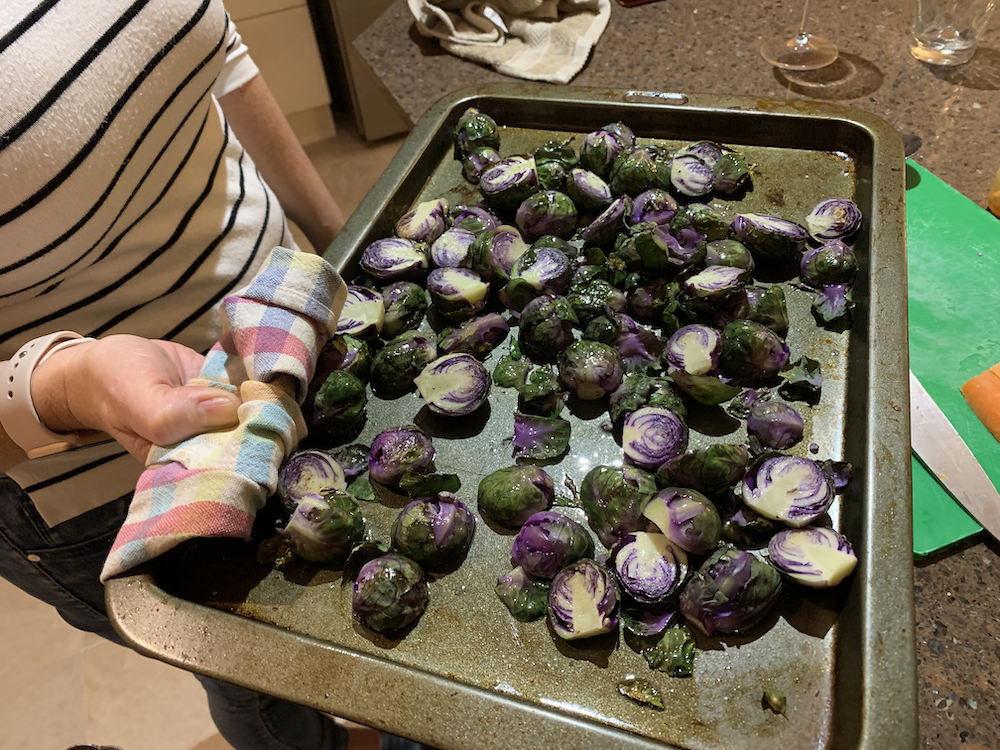Now this could start a HUGE debate, but I love Brussels sprouts! I didn’t like them as a child, perhaps due to how they were cooked, but I’ve come to love them as an adult. They need to be fried or baked until crispy, with lots of oil (and maybe some butter). They are even better with bacon and breadcrumbs (pangrattato for those Masterchef fans!). You might think this is a strange way to start a blog about mathematics, but sadly, mathematics and Brussels spouts have something in common. They are socially polarising, and many kids hate them both.
But we need to change this mis-guided opinion, of mathematics I mean. We may not bring everyone around to also like Brussels sprouts, but with some extra trimmings and some good planning, both can be very enjoyable and even good for you! I recently heard Adam Liaw (of Masterchef fame) in a radio interview talking about vegetables and children’s distaste for some vegetables like broccoli that can be quite bitter. He provided some great insights:
“… nobody likes coffee when they first have it … after a bunch of different positive reinforcements we get an idea of why we like coffee … we have these positive experiences that teach us to like coffee …” Adam Liaw
Adam’s talking about coffee here, but he then relates this to vegetables. He talks about creating positive experiences for liking vegetables and I think this is the same advice I’d give teachers and parents about helping your child/ren like or even love mathematics. Create positive experiences.
He goes on to say “If you want your kids to like vegetables, don’t get angry with them … don’t shout at them for not liking vegetables”, because that’s a negative experience with the vegetables. I see a similar pattern appearing when children are told ‘don’t worry if you’re not good at maths, I wasn’t good at it either’ or when children overhear their parent saying ‘I hated maths’. These experiences are negative views and lead children to have negative views of mathematics. We need to help children see the joy, interest, and purpose of mathematics in everyday situations.
“If you want your kids to eat vegetables, eat vegetables yourself.” Adam Liaw
Lead by example – this advice from Adam about allowing your child/ren to see you doing the things that are good for them, or seeing you enjoy them, means they will learn to like them too. This strategy for liking vegetables will work wonders for mathematics too. If children see you enjoying mathematics and using mathematics in your daily life for work or leisure, soon they will also see it’s value.
“If you want your kids to like mathematics, do mathematics yourself”
Tips for making maths taste better
- talk to your kids about the maths you use daily – to set your morning alarm, to work out what train or bus to catch, decide which items to buy at the supermarket ’cause they’re on sale.
- notice and acknowledge the maths you, and your kids use – let them know what you are doing to work out the 25% discount, say ‘that’s great maths’ when they read the time correctly, explain the maths you use when you double a recipe or decide how to cut a cake.
- let them know that it takes more than one try – to like any food, different research suggests between 10 to 30 times trying it is needed. Maths is similar, kids (and adults) need to stick at giving it a go … you just might not like it, yet.
- help them see how you, and others, use maths in their jobs – tell them what parts of maths are important for you in your work, it doesn’t have to be ‘all’ of maths to get kids started. Maths/Science Youtubers like Mark Rober, Eddie Woo, Derek Muller, Numberphile, 3Blue1Brown, How Ridiculous are great for inspiration and entertainment that all involve mathematics.
- making learning maths interesting – sometimes ‘school’ maths gives maths a bad name, just like boiling vegetables to death gives Brussels sprouts (any green veg really) a bad name. Play card games, dice games, dominoes, read maths picture books, do one question of homework then draw a picture to represent what it means, play ‘beat the parent’ do the homework with your kids – by this I mean you do the questions too then compare your ways of working
I wonder if chefs cringe when they hear people say “I don’t like vegetables” the same way I cringe when I hear people say they don’t like maths. I wasn’t born loving maths, it became more and more interesting and relevant and beautiful to me as time went on. So the ‘cringe-worthy’ statement of ‘I hate maths’ probably came out of my mouth at some point. But from the position of hindsight, I wish others at the time would have said to me things like “yeah, maths is hard but it can be really useful” or “what about maths don’t you like?” or “I struggled with maths but let’s work it out together” or “yeah, it’s challenging but your brain loves a challenge”. These may sound corny, but they might just have inspired me to love maths sooner, instead of thinking I wasn’t a maths person. Creating positive maths experiences reinforces the idea that maths is for everyone and can be enjoyed, Bon appétit!
PS I also learned through writing this blog that they are called Brussels sprouts, I’ve always pronounced it brussel sprouts! Is this just me? (I knew they were named after Brussels, a very beautiful city which I’ve visited, I just never put two and two together).






